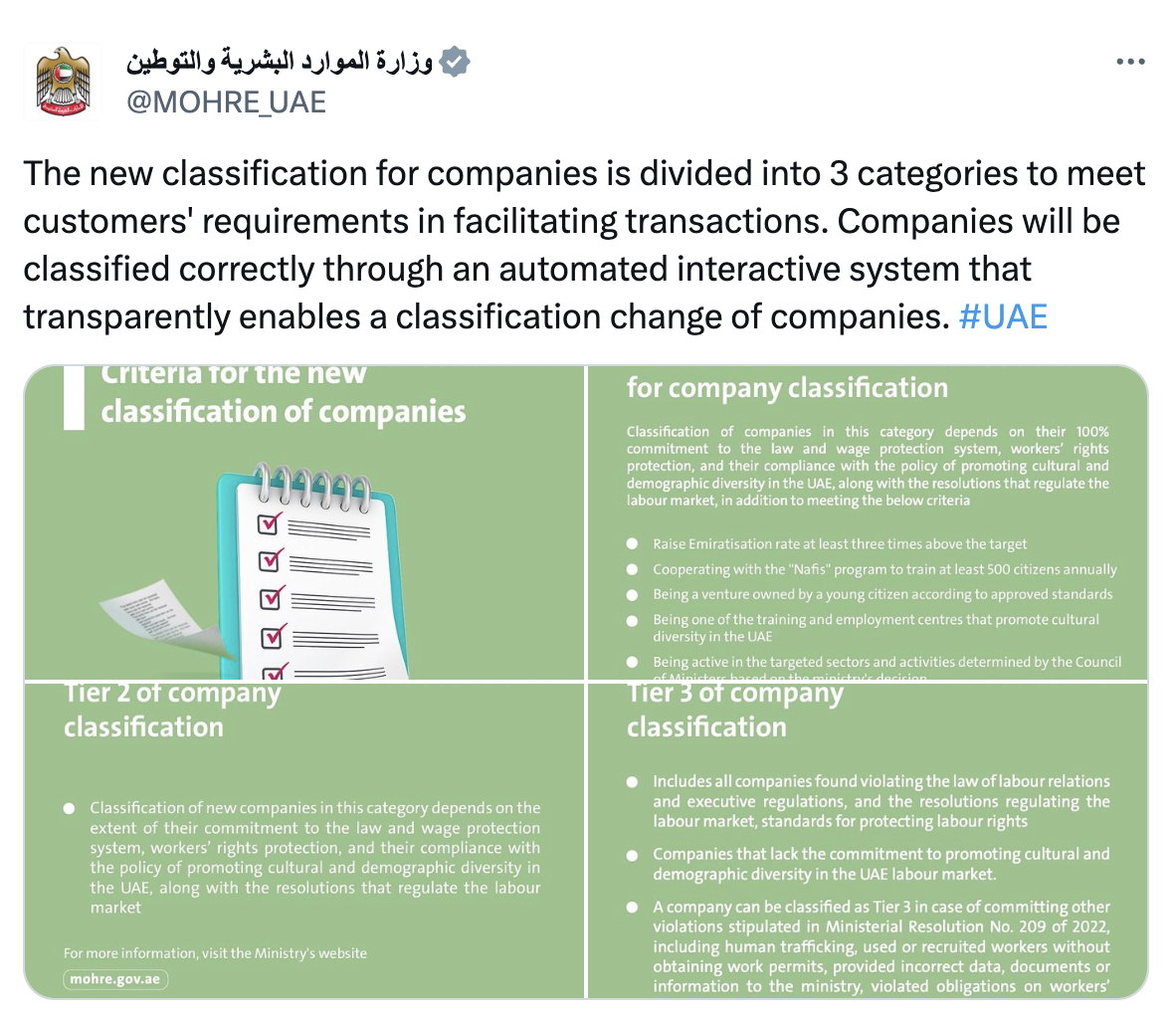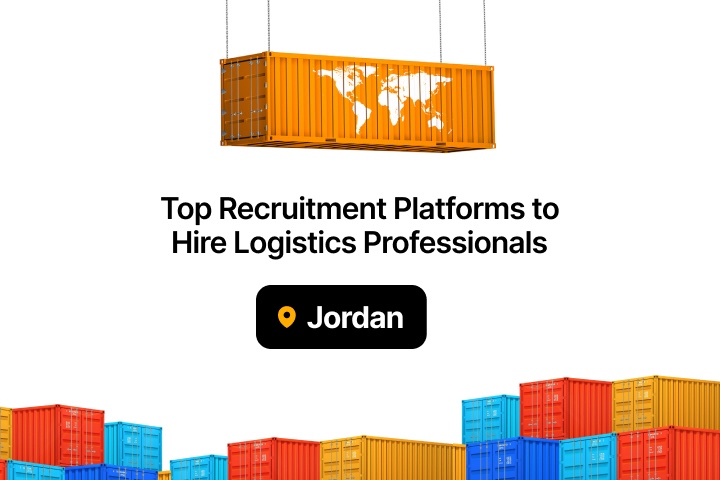Emiratisation aims to maximize the number of Emiratis in the private sector to 75,000 in the next five years. The government has developed the Nafis program, with various sub-initiatives, to ensure that all Emiratis benefit from this prestigious scheme. The rules of Emiratisation / Nafis are stringent, and any private sector company that does not comply is faced with severe penalties. The UAE government takes any dubious activity or deviation from the rules seriously!
Also read: UAE Labour Laws Penalties
{{hi-link="/sandbox/home-v3"}}
According to a news report by Khaleej Times, The Ministry of Human Resources and Emiratisation has taken action against 113 private companies, referring them to the Public Prosecution for breaching Emiratisation regulations in the UAE. Among these, 98 companies have been identified for illegitimately appointing citizens to fictitious Emiratisation positions, while an additional 15 companies have been implicated in sidestepping Emiratisation targets.
From the latter half of 2022 until the end of 2023, a staggering 894 companies have been found in breach of Emiratisation decisions, and a concerning revelation unfolds as 1,267 UAE nationals have been unlawfully employed in fictitious Emiratisation roles.
The Ministry has not hesitated to implement legal and administrative actions against companies guilty of evading Emiratisation targets. This involves imposing a substantial administrative fine of Dh100,000 on each non-compliant company, not only for falling short of the annual Emiratisation growth rate but also leading to their referral to the Public Prosecution.
3-Tier Classification of Companies by the Ministry of Human Resources and Emiratisation UAE
The Ministry of Human Resources and Emiratisation (MOHRE) in the United Arab Emirates has implemented a three-tier rating system for private enterprises, evaluating their dedication to Emiratisation initiatives. The categories direct the incentives & penalties companies receive for compliance with the Emiratisation laws.

The tiered structure stands as follows:
Tier 1
Tier 1 includes companies actively elevating their Emiratisation rate by 3% above the target and collaborating with the Nafis Training Programme.
To qualify for this category, companies must actively achieve at least one of the following objectives:
- Increasing the Emiratisation rate to a minimum of three times above the set target,
- Collaborating with the 'Nafis' program to annually train a minimum of 500 citizens,
- Operating as a training and employment center to support the implementation of the Workforce Planning Policy by promoting cultural diversity within the UAE,
- Actively engaging in the designated sectors and activities outlined by the government, adhering to approved standards.
In recognition of their commitment, the Ministry of Human Resources and Emiratisation (MoHRE) rewards these companies by capping work permit fees at a maximum of AED 250 for two years, with the noteworthy exemption of UAE and GCC employees from these fees.
Also read: Gulftalent Alternatives in 2023
Tier 2
Tier 2 includes private enterprises that successfully meet the target while adhering to UAE cultural and demographic diversity regulations. Similar to tier 1, the categorization of companies within this group hinges on the depth of their commitment to various factors, including;
- Labor law,
- The wage protection system,
- Regulations governing the labor market,
- The protection of workers' rights, and
- The promotion of diversity within the UAE.
Within tier 2, companies are further classified into subcategories denoted as A, B, C, or D. This classification is determined based on the proportion of skilled workers and the degree of the company's dedication to fostering multicultural diversity when granting work permits. Companies that fail to meet these criteria are relegated to tier 3.
Also read: UAE Labour Laws: Employment Contracts, Records and Wages
Tier 3
Tier 3 includes private organizations falling short of the target and displaying a lack of commitment to the UAE's policies regarding cultural and ethnic diversity.
Companies that fail to comply with the Emiratisation quota fall under this category. Similarly, companies that commit other violations stipulated in Ministerial Resolution No. 209 of 2022, such as:
- Using or recruiting workers without obtaining work permits,
- Providing incorrect data, documents, or information to the Ministry,
- Violating obligations on workers’ wages, housing, and safety standards,
- Conducting fake Emiratisation practices or committing other serious violations also falls under this category.
Also Read: Work Culture In the UAE
Penalties for Non-Compliance to Emiratisation/Nafis Program
Non-compliance with Emiratisation regulations carries a range of significant consequences for UAE employers, including fines, reputational damage, and legal repercussions. Following are some ways in which companies in the private sector suffer due to their negligence in complying with the rules of Emiratisation:
Fines and Penalties:
Companies that fail to meet Emiratisation quotas or engage in fraudulent practices to meet these requirements can face substantial fines. In January 2023, the Ministry of Human Resources and Emiratisation (MoHRE) announced a target for private companies to increase Emiratis' workforce by 2% annually until 2026.
In 2026, companies with a staff size ranging from 20 to 49 individuals are mandated to include at least one Emirati employee. Failure to meet this requirement will result in a financial obligation of AED 96,000 payable to the government. Furthermore, by 2026, companies falling within this category that have not hired two Emiratis will face an increased contribution of AED 108,000
One such pressing issue is the problem of fake Emiratisation, where some companies hire "ghost workers" to meet their Emiratisation quotas. This unethical practice involves the creation of fictitious employment contracts or misrepresenting job roles to appear compliant with Emiratisation regulations. Companies found guilty of systematic non-compliance have to pay hefty fines.
Reputational Damage:
News of non-compliance, especially related to fake Emiratisation, can severely damage a company's reputation. It erodes customers, partners, stakeholder’s trust, business opportunities, and market shares. Numerous cases of noncompliance have garnered media attention. One notable example involved a well-known construction company in the UAE that faced a substantial fine for hiring ghost workers to meet Emiratisation requirements and suffered extreme reputational damage.
Legal Action:
The UAE government takes non-compliance seriously and takes legal action against companies involved in fraudulent Emiratisation practices. This can lead to costly legal battles, further impacting a company's financial stability and image.
In collaboration with the Nafis program, the Ministry of Human Resources and Emiratisation announced the successful recovery of over Dh2.3 million financial support from 107 Emirati citizens who had accepted deceptive employment offers in the private sector. The UAE government has introduced financial incentives to encourage citizens to transition from traditionally higher-paying public sector roles to the private sector, including a monthly salary supplement of Dh7000. Despite these incentives, the ministry issued a stern warning, urging citizens not to fall prey to fraudulent job offers from companies seeking to evade their employment targets, emphasizing the importance of genuine Emiratisation compliance.
How Qureos Helps You Avoid Emiratisation Fines
{{h2-link="/sandbox/home-v3"}}
Iris is an advanced and revolutionary solution to facilitate Emiratisation compliance for companies across the United Arab Emirates. It leverages the power of AI to streamline the recruitment process to ensure that businesses meet Emiratisation requirements. Iris can help private sector companies source Emirati talent to meet compliance standards. This precision minimizes the risk of hiring ghost workers or engaging in fraudulent practices, safeguarding businesses from heavy fines and reputational damage.
Iris is a game-changer for UAE employers, offering an innovative solution to achieve genuine Emiratisation compliance. As the UAE continues to nurture local talent and foster national development, IRIS empowers businesses to navigate Emiratisation regulations seamlessly and contribute to a prosperous and inclusive Emirati workforce.
Conclusion
Complying with the rules and regulations of Emiratisation is of utmost significance for all private enterprises to ensure smooth operations and leverage government support for business development. Companies struggling to find the right Emirati talent to fill various positions can leverage tools like Iris to match the right Emirati talent for each position within seconds. It is no secret that the private sector can only sustain its growth if it can foster a competitive Emirati workforce and explore ways to give back to the local community. Finally, a fruitful collaboration with the Emirati community in UAE is also essential to avoid heavy penalties and fines by the government.




